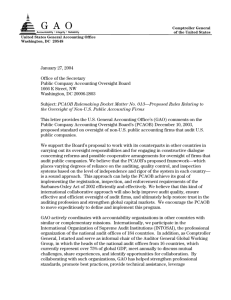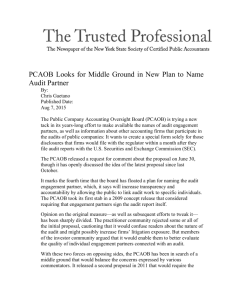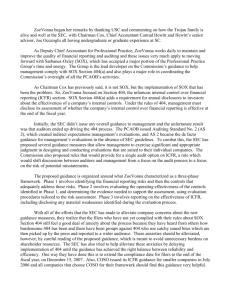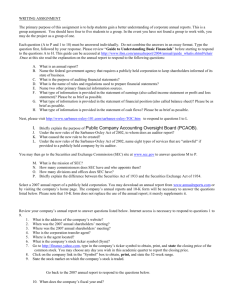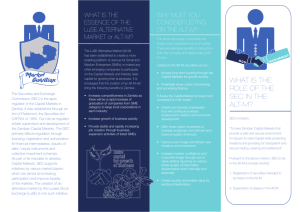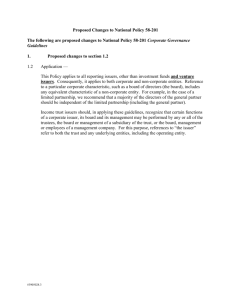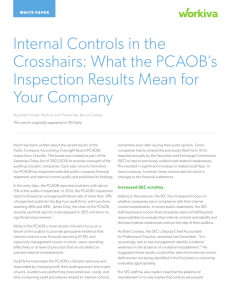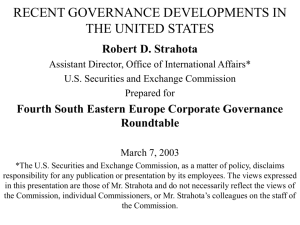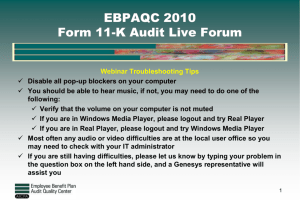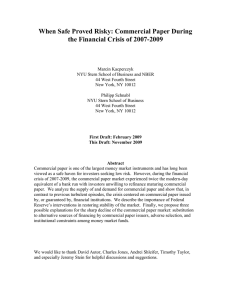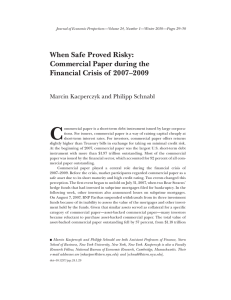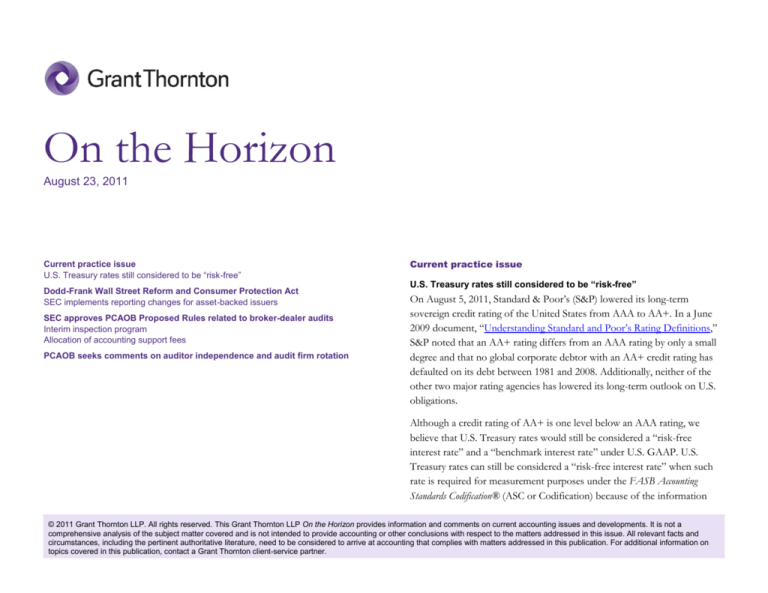
On the Horizon
August 23, 2011
Current practice issue
U.S. Treasury rates still considered to be “risk-free”
Dodd-Frank Wall Street Reform and Consumer Protection Act
SEC implements reporting changes for asset-backed issuers
SEC approves PCAOB Proposed Rules related to broker-dealer audits
Interim inspection program
Allocation of accounting support fees
PCAOB seeks comments on auditor independence and audit firm rotation
Current practice issue
U.S. Treasury rates still considered to be “risk-free”
On August 5, 2011, Standard & Poor’s (S&P) lowered its long-term
sovereign credit rating of the United States from AAA to AA+. In a June
2009 document, “Understanding Standard and Poor’s Rating Definitions,”
S&P noted that an AA+ rating differs from an AAA rating by only a small
degree and that no global corporate debtor with an AA+ credit rating has
defaulted on its debt between 1981 and 2008. Additionally, neither of the
other two major rating agencies has lowered its long-term outlook on U.S.
obligations.
Although a credit rating of AA+ is one level below an AAA rating, we
believe that U.S. Treasury rates would still be considered a “risk-free
interest rate” and a “benchmark interest rate” under U.S. GAAP. U.S.
Treasury rates can still be considered a “risk-free interest rate” when such
rate is required for measurement purposes under the FASB Accounting
Standards Codification® (ASC or Codification) because of the information
© 2011 Grant Thornton LLP. All rights reserved. This Grant Thornton LLP On the Horizon provides information and comments on current accounting issues and developments. It is not a
comprehensive analysis of the subject matter covered and is not intended to provide accounting or other conclusions with respect to the matters addressed in this issue. All relevant facts and
circumstances, including the pertinent authoritative literature, need to be considered to arrive at accounting that complies with matters addressed in this publication. For additional information on
topics covered in this publication, contact a Grant Thornton client-service partner.
On the Horizon August 23, 2011
noted above. U.S. Treasury rates can also still be considered a “benchmark
interest rate,” as defined in the Codification, because these rates continue to be
a “widely recognized and quoted rate in an active financial market that is
broadly indicative of the overall level of interest rates attributable to high-creditquality obligors in that market.”
While S&P’s downgrade of U.S. treasuries has no impact on their use as a riskfree interest rate or benchmark interest rate, there may be other financial
reporting implications of this downgrade, including enhanced disclosures.
Dodd-Frank Wall Street Reform and Consumer Protection Act
The Dodd-Frank Wall Street Reform and Consumer Protection Act (Dodd-Frank Act)
mandates numerous studies and regulatory rule changes. Initiatives that impact financial
reporting are described in On the Horizon as information becomes available.
Section 15(d). A registrant is required to test for the requirement to report
semiannually.
The Final Rule will be effective September 22, 2011.
SEC approves PCAOB Proposed Rules related to broker-dealer
audits
Interim inspection program
The SEC approved a Final Rule, Order Approving Proposed Temporary Rule for
an Interim Program of Inspection Related to Audits of Brokers and Dealers, which
established a temporary interim inspection program related to audits of
brokers and dealers. The Final Rule permits the PCAOB to begin
inspections of relevant audits and auditors, thereby allowing it to obtain
information that would be beneficial in making decisions about the scope
and elements of a permanent program.
SEC implements reporting changes for asset-backed issuers
The SEC issued a Final Rule, Suspension of the Duty to File Reports for Classes of
Asset-Backed Securities Under Section 15(d) of the Securities Exchange Act of 1934, to
provide for the suspension of reporting obligations for asset-backed securities
issuers if (1) there are no asset-backed securities of the class sold in a registered
transaction held by non-affiliates of the depositor, and (2) a certification on
Form 15 has been filed.
The Final Rule implements the requirements of Section 942(a) of the DoddFrank Act, which eliminated the automatic suspension of the filing requirement
for issuers of asset-backed securities under Section 15(d) of the Securities
Exchange Act of 1934 (Exchange Act). The Final Rule also amends existing
SEC Rules relating to the Exchange Act reporting obligations of asset-backed
securities issuers to ensure they are consistent with the amendment in
Allocation of accounting support fees
The SEC approved a Final Rule, Order Approving Proposed Board Funding Final
Rules for Allocation of the Board’s Accounting Support Fee Among Issuers, Brokers,
and Dealers, and Other Amendments to the Board’s Funding Rules, which was
adopted by the PCAOB in June 2011. The Final Rule creates classes of
brokers-dealers for funding purposes, describes the method for allocating
the appropriate portion of the accounting support fee to each broker and
dealer within each class, and addresses the collection of support fees from
brokers and dealers.
For more information on the interim inspection program and the allocation
of accounting support fees, please refer to the June 21, 2011 edition of On
the Horizon.
2
On the Horizon August 23, 2011
The Final Rules were effective August 18, 2011.
PCAOB seeks comments on auditor independence and audit firm
rotation
The PCAOB recently issued its Concept Release on Auditor Independence and Audit
Firm Rotation; Notice of Roundtable to solicit public comment on ways to enhance
auditor independence, objectivity, and professional skepticism, including
mandatory audit firm rotation as one possible approach to enhancing audit
quality. Mandatory audit firm rotation as set forth in the Concept Release
would require audit firms to rotate off an audit engagement after a set
number of consecutive years and could be applied to certain classes of
issuers.
Comments on this Concept Release are due by December 14, 2011. The
PCAOB intends to hold a roundtable on these issues in March 2012.
3

